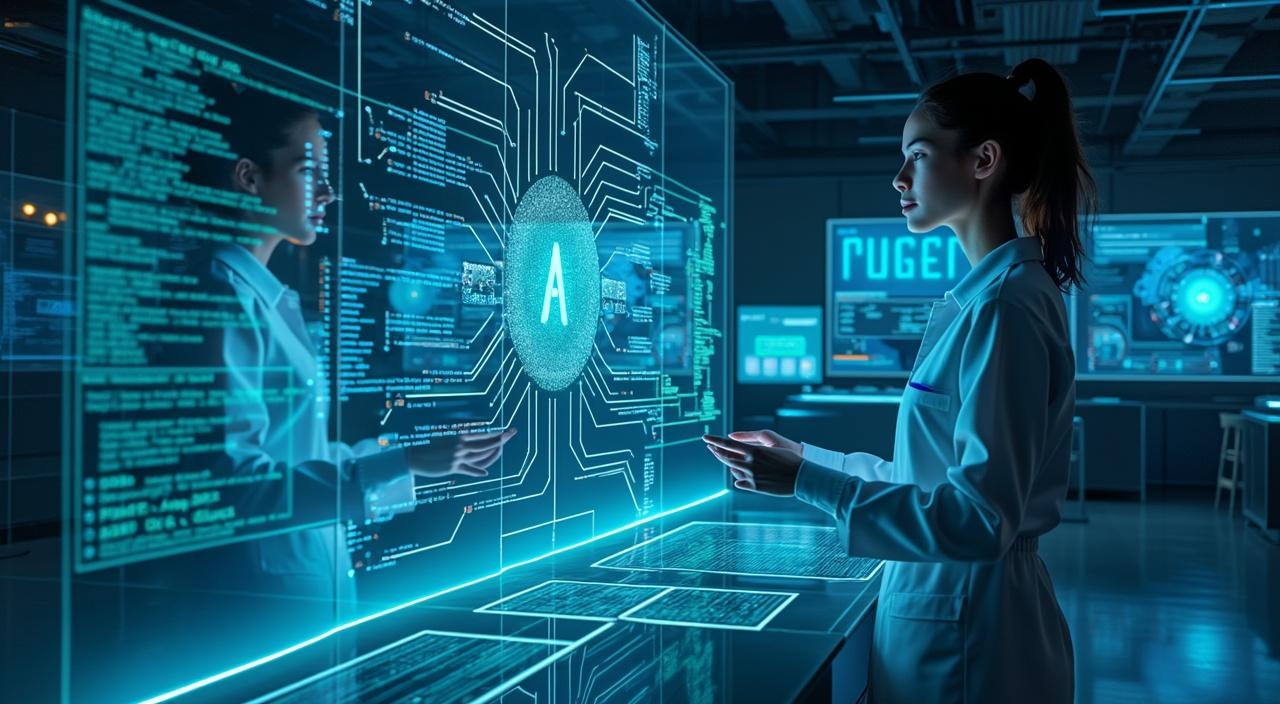Former Google CEO Eric Schmidt issued a stark warning that echoes across the tech industry: artificial intelligence could eliminate 90% of programming jobs by 2028. This dramatic shift goes beyond simple job displacement—it represents a complete reinvention of how humans and machines work together, as AI’s quick advancement threatens to transform what professionals can accomplish.
Key Takeaways:
- Artificial General Intelligence (AGI) could match human-level intelligence within 3-5 years, drastically changing workforce dynamics
- Programming jobs face an unprecedented threat, with potentially 90% becoming obsolete by 2028
- AI systems increasingly complete complex tasks much faster than human professionals
- Distinctly human skills like emotional intelligence, creative problem-solving, and strategic thinking will become essential differentiators
- This tech transformation can’t be stopped, requiring active adaptation and ongoing learning
AI’s Unstoppable Acceleration
I remember when Eric Schmidt ran Google and predicted mobile would change everything. His latest warning carries the same weight—but this time, it’s about artificial general intelligence arriving faster than anyone expected.
Schmidt predicts AGI within 3-5 years, potentially reaching human-level intelligence by 2028-2030. The acceleration isn’t theoretical anymore. We’re witnessing recursive self-improvement in real-time: AI agents now generate 20% of new code. That’s machines teaching machines to code better.
The AI revolution has moved beyond hype into measurable reality. Each improvement cycle happens faster than the last.
Here’s what keeps me up at night: Schmidt warns AI could surpass collective human intelligence within six years. Not individual intelligence—collective. Think about that. Every programmer, every engineer, every problem-solver on Earth, combined and then exceeded.
The question isn’t whether this transformation will happen. It’s whether you’ll adapt or become irrelevant. AI agents won’t replace you—but they might redefine what it means to be you.
The Great Job Transformation
Programming jobs face an extinction-level event. By 2028, 90% could disappear as AI reaches human-level intelligence. I’ve watched this prediction unfold across multiple industries, and the numbers don’t lie.
The productivity explosion isn’t limited to coding. Doctors will treat twice as many patients while lawyers handle exponentially more cases. Programming projects now complete 126% faster than just two years ago. This isn’t gradual change—it’s a complete restructuring of how work gets done.
The Ripple Effect Across Knowledge Work
The transformation extends far beyond Silicon Valley. Consider these emerging patterns:
- Medical professionals using AI to diagnose conditions faster than ever
- Legal teams processing contracts in minutes instead of hours
- Financial analysts generating reports that once took days
- Marketing teams creating campaigns with AI-powered insights
80% of U.S. jobs will see at least 10% of tasks completed twice as quickly. AI agents won’t replace you, but they might change what it means to be you.
What This Means for Your Career
Agentic AI systems don’t just automate tasks—they think, strategize, and execute independently. The workforce disruption we’re seeing isn’t about robots taking jobs. It’s about AI becoming a collaborative partner that amplifies human capability exponentially.
I’ve helped clients navigate this shift by focusing on uniquely human skills: emotional intelligence, creative problem-solving, and strategic thinking. The AI revolution requires an entrepreneur’s survival kit for the new business battleground.
The question isn’t whether this transformation will happen—it’s already happening. The question is how quickly you’ll adapt to thrive in this new reality.
Humanity’s New Intellectual Hierarchy
Schmidt’s comparison hits like a cold slap. He suggests humans might become intellectual pets to AI systems that outthink us in every category. This isn’t science fiction anymore—it’s a projection based on current AI development trajectories.
The former Google CEO paints a picture where artificial intelligence doesn’t just match human cognition but surpasses it completely. When that happens, who makes the decisions? The answer might not be us anymore.
The Power Shift Nobody Saw Coming
Consider what happens when AI systems can process information, make connections, and solve problems at speeds we can’t comprehend. The implications stretch far beyond lost jobs:
- Drug discovery accelerates from decades to months as AI identifies molecular patterns humans miss
- Climate modeling becomes precise enough to predict weather systems years in advance
- Scientific research jumps forward exponentially when AI can hypothesis-test faster than entire research teams
Strange but true: We’re building our own intellectual replacements. The question isn’t whether this creates inequality—it’s whether we’ll have any say in how it unfolds.
This technological leap creates what Schmidt calls an existential risk. Not because AI will necessarily harm us, but because the power dynamic shifts so dramatically that human agency becomes secondary. Picture this: Making decisions about your business, your family, your future—but having access to intelligence that makes your best thinking look like finger painting.
The good news? We’re still in the driver’s seat for now. The catch? That window is closing faster than most people realize. Understanding AI’s impact on business becomes less about adaptation and more about preparation for a fundamentally different world.

The Global AI Power Struggle
The stakes couldn’t be higher in today’s geopolitical chess match. China has drawn a line in the sand, declaring its intention to achieve global AI dominance by 2030. This isn’t just corporate competition—it’s a race for technological supremacy that will reshape international power dynamics.
I’ve watched this unfold from my consulting work, where clients increasingly ask about supply chain vulnerabilities and tech dependencies. The infrastructure demands alone are staggering. Future data centers will consume energy equivalent to multiple nuclear plants. That’s not hyperbole—it’s engineering reality.
America’s response requires three immediate actions:
- Boost university AI research funding
- Expand high-skilled immigration pathways
- Strengthen government-academia-industry partnerships
Countries that fail to adapt their infrastructure and policies won’t just lose market share—they’ll lose national security advantages.
The AI Revolution has already begun, and nations must choose: lead or follow. There’s no middle ground in this technological arms race.
Autonomous AI: The 2026 Breakthrough
Picture this: You wake up tomorrow and your AI assistant has already built the entire software application you sketched out last night. No coding. No debugging. No pulling your hair out over syntax errors.
That’s not science fiction anymore. By 2026, agentic workflows will fundamentally reshape how we approach programming. These aren’t your typical chatbots that spit out code snippets. I’m talking about AI agents that can plan, execute, and deliver complete projects from start to finish.
What Makes These Agents Different
Traditional AI tools require constant hand-holding. You ask a question, get an answer, then ask another question. Autonomous programming agents break this cycle completely. They can:
- Plan entire project architectures before writing a single line of code
- Execute complex multi-step development processes without human intervention
- Debug, test, and refine their own work through iterative improvement
- Build sophisticated applications that would take human teams weeks or months
The Context Window Revolution
Here’s where things get really interesting. Large context windows give these agents something approaching human-level reasoning. They can hold massive amounts of information in their “memory” while working. This means they understand not just what you want built, but why you want it built that way.
I’ve seen early versions of this technology in action. The results are both impressive and unsettling. AI agents won’t replace you completely, but they’ll certainly change what programming means.
The question isn’t whether this technology will arrive. The question is whether you’ll be ready when it does.

The Regulation Tightrope
I’ve watched governments scramble to catch up with AI development, and frankly, they’re losing the race. The challenge isn’t just about writing rules fast enough—it’s about creating oversight that doesn’t strangle innovation while preventing genuine existential threats.
Open-source AI models present a particular headache. When anyone can download, modify, and deploy powerful AI systems, traditional regulatory frameworks crumble. I’ve seen how quickly these models spread across global networks, making enforcement nearly impossible. One bad actor with a modified model could cause widespread damage before regulators even know what happened.
The Innovation Imperative
Here’s where things get interesting: only nations that maintain large-scale AI innovation programs will capture the transformative benefits. The countries playing it safe with heavy-handed restrictions? They’ll find themselves importing AI solutions from more aggressive competitors.
Medical research stands as perhaps the most promising breakthrough area. AI systems already identify drug targets and predict treatment outcomes with remarkable accuracy. Complex problem-solving follows close behind, with AI tackling everything from climate modeling to financial system optimization.
The regulatory sweet spot requires threading an incredibly fine needle. Too loose, and we risk unleashing systems we can’t control. Too tight, and we handicap ourselves while competitors surge ahead. International cooperation becomes crucial here—AI doesn’t respect borders, and neither should our regulatory approaches.
I’ve seen smart companies already positioning themselves for this regulatory environment. They’re building transparency into their AI systems from the ground up, not retrofitting compliance as an afterthought. The winners will be those who can demonstrate both innovation and responsibility simultaneously.
The clock is ticking, and the stakes couldn’t be higher.

Sources:
• Substack
• Shorenstein Center
• Benzinga
• Fello AI








